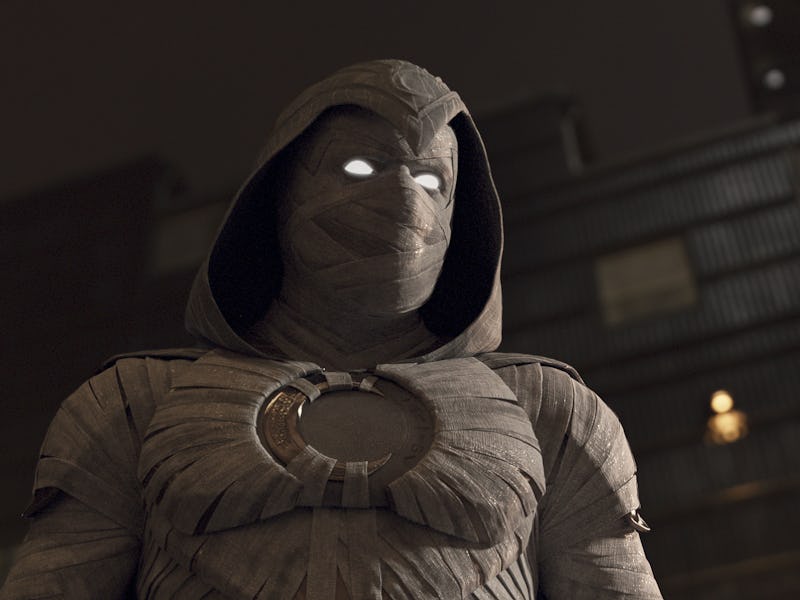By avoiding Orientalist tropes, Moon Knight continues Marvel's most important trend
This isn't the first time the MCU has been careful, nor is it the last.

Expanding the Marvel Universe means superhero stories are now featuring characters from backgrounds that don’t usually get the blockbuster treatment. Moon Knight on Disney+ is no different, and fortunately, it’s only the latest of an ongoing trend in the MCU.
In a recent interview on IGN, director Mohamed Diab spoke about wanting to subvert Hollywood’s entrenched Orientalist tropes when it came to depicting Egypt. The show begins to explore Egypt in its third episode, which premiered this week on Disney+.
“As an Egyptian, seeing us always portrayed in the wrong way, always portrayed with this... we call it orientalism,” he told IGN. “It dehumanizes us. And where women are submissive, and those kind of tropes.”
The title character of Moon Knight is not Egyptian — in the comics, Marc Spector is Jewish, and one of the earliest triggers of his multiple personality identity disorder is bearing witness to anti-Semitic violence — but Moon Knight’s powers are endowed by Khonshu, the Egyptian god of the Moon. For Diab, it matters for Hollywood to show a side of Egypt that wide audiences don’t see often enough.
“It was very important for me to portray us as normal human beings,” he said. On setting a part of the show in Cairo, Diab wanted to show it as the modern city it actually is, not just focusing on the pyramids in the middle of the desert. “It’s twenty million people, and we have skyscrapers, and it's a normal place just like this.”
WHAT’S YOUR FAVORITE TIME-TRAVEL MOVIE? Click here to help us rank all the ones on Netflix.
Moon Knight’s depiction of Egypt is more than just the pyramids.
The MCU is not the first movie franchise to pair talent and artists with culturally specific material, but it has been one of the most successful. 2018’s Black Panther, which had a majority Black cast and filmmaking team including writer/director Ryan Coogler, is maybe the best example of what happens when a mainstream tentpole is staffed by storytellers who can speak from a personal and collective experience.
Shang-Chi and the Legend of the Ten Rings, which had a majority Asian cast and crew, similarly grounded a Marvel superhero in the Asian-American experience — that being multi-hyphenated upbringings, the limits of filial piety, and the unbearable weight of expectations placed upon children.
Writer David Callaham said as much to Inverse when we spoke to the Shang-Chi scribe last year. “We recognize the value of letting the people who live the stories tell the stories,” Callaham told Inverse. “I was very blunt with Marvel from day one. I said, ‘I want to talk about what it means to be an Asian person in America.’ I want to share with the world what this experience has been like for me, just because selfishly, that’s the story I knew.”
While Moon Knight is not technically an Egyptian superhero, its Egyptian roots were an opportunity for director Mohamed Diab to buck Hollywood’s entrenched Orientalist tropes that typically depict Egypt as an otherworldly place than the modern nation it really is.
Because of the complicated bureaucracy that the MCU was built upon, it’s incorrect to say any specific projects “course-corrected” Marvel’s current approach. But we can’t ignore the criticisms of Iron Fist.
The Marvel/Netflix show followed Danny Rand (played by Game of Thrones alum Finn Jones), a white outsider who returns to New York with supernatural kung fu powers from Asia (the fictional country of K’un-Lun). The show’s unwillingness to meaningfully engage with any of its components rendered it one of the more unpopular shows in the Marvel canon.
That Black Panther came out after Iron Fist, made a billion dollars, and was nominated for an Oscar quickly proved what studios can get when they hire the right storytellers. It’s happened with Shang-Chi (which made pandemic box office records), it’s happening again with Moon Knight (which by all accounts is as popular as any Marvel series on Disney+), and it might happen with Ms. Marvel, the next MCU series with a majority Muslim team of producers, writers, and directors.
In the tradition of 2018’s mega-successful Black Panther, 2021’s Shang-Chi and the Legend of the Ten Rings had a creative team of Asians and Asian-Americans. That includes writer David Callaham, who says the movie was spiritually imbued with his own experiences growing up as an Asian-American.
As Shang-Chi writer David Callaham told us last year, “The goal with something as big as a Marvel movie is always going to appeal to an incredibly large audience. [With Shang-Chi] we’re not trying to only appeal to Asian or Asian-Americans, but I honestly don’t know how this could have been accomplished without tons of Asian experiences behind the camera.”
By design, Marvel products must appeal to a general audience. Still, the MCU is making new strides by introducing characters who aren’t of the same straight white male mold that has been Hollywood’s image of heroes for decades. In doing so, shows like Moon Knight exemplify precisely why it’s becoming important that the storytellers can relate to their own characters.
Moon Knight is now streaming on Disney+.
This article was originally published on